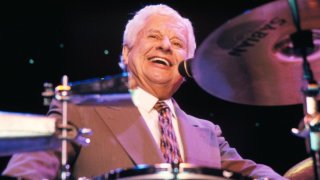
In honor of Hispanic Heritage Month, Google Doodle is paying homage to "The King of Latin Music" Tito Puente with an animated video on Google's homepage.
Created by New York-based Puerto Rican illustrator Carlos Aponte, the doodle features "Ran Kan Kan," Puente's first studio track.
"Tito was part of my musical experience growing up in Puerto Rico," Aponte said. "My aunt introduced me to Tito Puente via La Lupe, a famous singer in Puerto Rico and New York. Tito was like a Svengali for talents like Celia Cruz. He was a household name. So Tito was part of my Puerto Rican soundtrack.
Puente was an internationally renowned singer, songwriter, bandleader, producer and percussionist. His most famous song "Oye Como Va," became widely popular in the 1970s after it was covered by rock band Santana.
Puente’s remarkable ability to be both Puerto Rican and American allowed him to seamlessly blend Latin music and American Jazz, a talent that put him on the global map.
Born and raised in New York City's Spanish Harlem to Puerto Rican parents, Puente started his career as a drummer in his early teens and found his big break playing for Federico Pagani’s Happy Boys and Machito’s Orchestra.
Entertainment News
After serving in the Navy during World War II, Puente attended the Juilliard School of Music and eventually started his own band. He quickly earned a reputation for his timbales (shallow kettledrums) performances that brought audiences to their feet.
Beyond the mambo movement, Puente experimented across other genres of Latin music such as the Boogaloo, Pachanga, and eventually Salsa. He was considered a musical pioneer for his creativity and experimentation, and is widely credited for popularizing Latin music in the United States. In 1969, he was awarded the key to New York City.
Get a weekly recap of the latest San Francisco Bay Area housing news. >Sign up for NBC Bay Area’s Housing Deconstructed newsletter.
The "Nuyorican," a portmanteau of his N.Y. and Puerto Rican roots, recorded over 118 albums and is credited on dozens more. He won six Grammy Awards during his decades-long career and was posthumously honored at the first-ever Latin Grammy Awards.
He died on June 1, 2000 at the age of 77.



